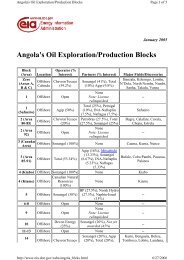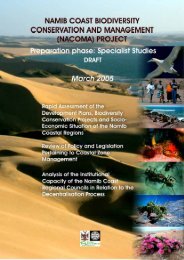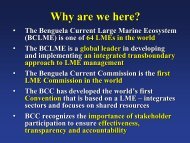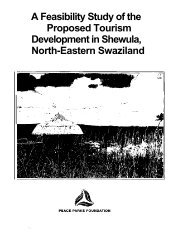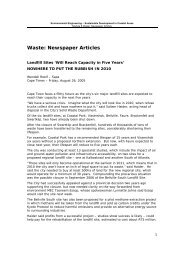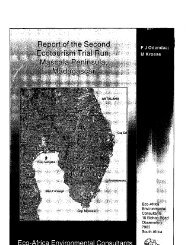Energising South African Cities & Towns - City Energy Support Unit
Energising South African Cities & Towns - City Energy Support Unit
Energising South African Cities & Towns - City Energy Support Unit
You also want an ePaper? Increase the reach of your titles
YUMPU automatically turns print PDFs into web optimized ePapers that Google loves.
Above left: The Bus Rapid Transit (BRT) system, Transmilenio, in Bogota. Above right: Efficient and safe public transport is an urgent need in <strong>South</strong> <strong>African</strong> cities.ProjectsThe challenge to developing sustainabletransport is that of implementation. A keyrequirement for effective implementation atthe local level is an appropriate distributionof power to local authorities. As yet, this isnot the case for rail. In terms of the NLTTA,commuter rail remains a national function.Other promising developments suggestpositive changes to come.A Taxi Recapitalisation project has beenintroduced, and from 2006, the Ministermay issue regulations specifying the typesof vehicles to be used.The Department of Labour is looking intoworking conditions in the taxi industry with aview to issuing a wage determination.And the Transport Education and TrainingAuthority has a Taxi Chamber whichis developing training programmes forthe industry.In term of non-motorised transport,the national department is partneringwith Dutch experts to develop infrastructureguidelines. Much more needsto be done by local transport planners tocater for pedestrians and cyclists, a hugechallenge given decades of institutionalisedmotorised biases.Once public transport alternatives havebeen developed, travel demand managementmeasures to restrict private car useand to redistribute resources to public transportwill be required.SUSTAINABLE NON-MOTORISEDTRANSIT IN CAPE TOWNA number of cities, particularly in Europe, promote non-motorised transitby developing pedestrian paths and cycleways and offering incentivesfor using bicycles for commuting. In Copenhagen, for example, one thirdof the population commutes to work by bicycle; and in the Netherlands,bicycles are used for 27% of all trips. These forms of transit are widelyviewed as sustainable because they substitute for automobiles, reducetraffic congestion and lower air pollution and noise.In Cape Town, as in most <strong>South</strong> <strong>African</strong> cities, walking and cyclingaccount for about 7% of the <strong>City</strong>’s trips. Apart from the non-conducivecity structure (great distances between work and home) , this is becausebicycle use in the <strong>City</strong> is widely perceived as unsafe.<strong>South</strong> <strong>African</strong>s aspire to drive a private motor vehicle rather thancycle to work, and women are discouraged from travelling by bicycle. Abias towards car-orientated engineering and planning results in bicycleand pedestrian facilities not receiving the attention that they deserve.However, local planners and developers are beginning to recognisethe potential contribution of non-motorised transit to achieving efficient,habitable and sustainable cities. In Cape Town the following initiativeshave been introduced:• A <strong>City</strong> of Cape Town Cycle Path Masterplan provides for a metropolitancycle path network that complements existing bicycle planning inlocal areas.• The Shova Kalula Bicycle Transport Demonstration Programme inKhayelitsha promotes the use of non-motorised transport, especiallyamong primary and secondary school students in the most disadvantagedrural and urban settings.• Two organisations – Afribike and the Bicycle Empowerment Network(BEN) – promote the distribution of second-hand bicycles to low-incomepeople in townships.• Cape Town was recently chosen to host the 2006 Velo Mondial (VM)Conference, a popular international event dedicated to promotingbicycle use, thus providing a deadline for getting the <strong>City</strong>’s bicycleplans implemented.ENERGISING SOUTH AFRICAN CITIES & TOWNS 27



